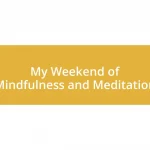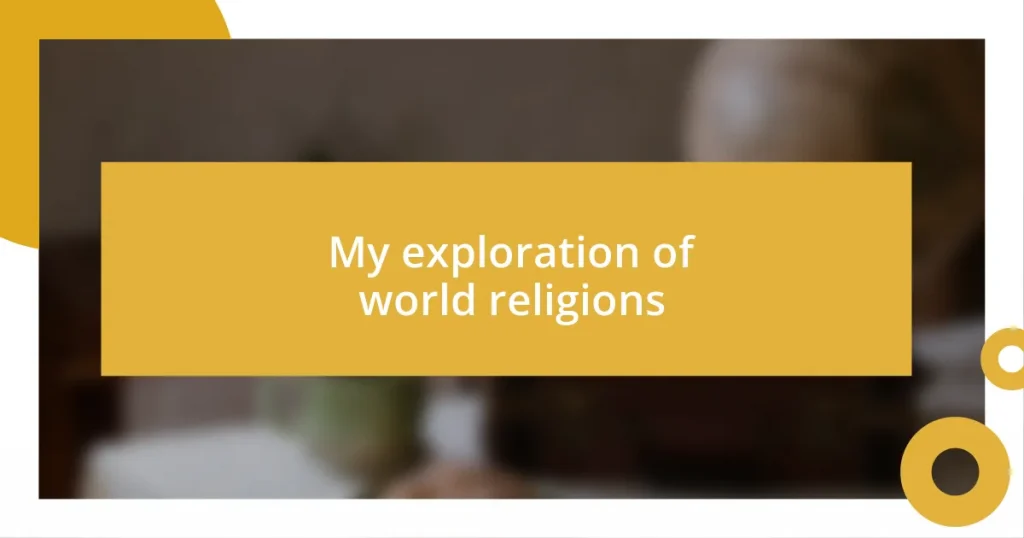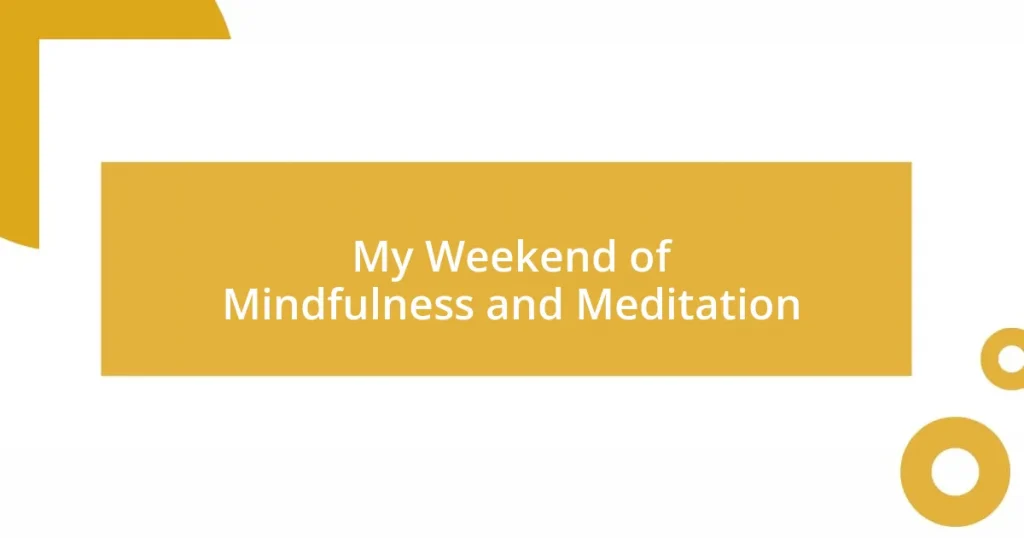Key takeaways:
- Exploring world religions reveals a common quest for meaning, connection, and understanding among diverse beliefs and practices.
- Interfaith dialogue fosters empathy and highlights shared values, such as compassion and forgiveness, promoting unity despite differences.
- Rituals and sacred texts play a pivotal role in shaping individual identities and community bonds within various faith traditions.
- Personal experiences with different faiths encourage spiritual growth and reflection, emphasizing the importance of compassion and service to others.
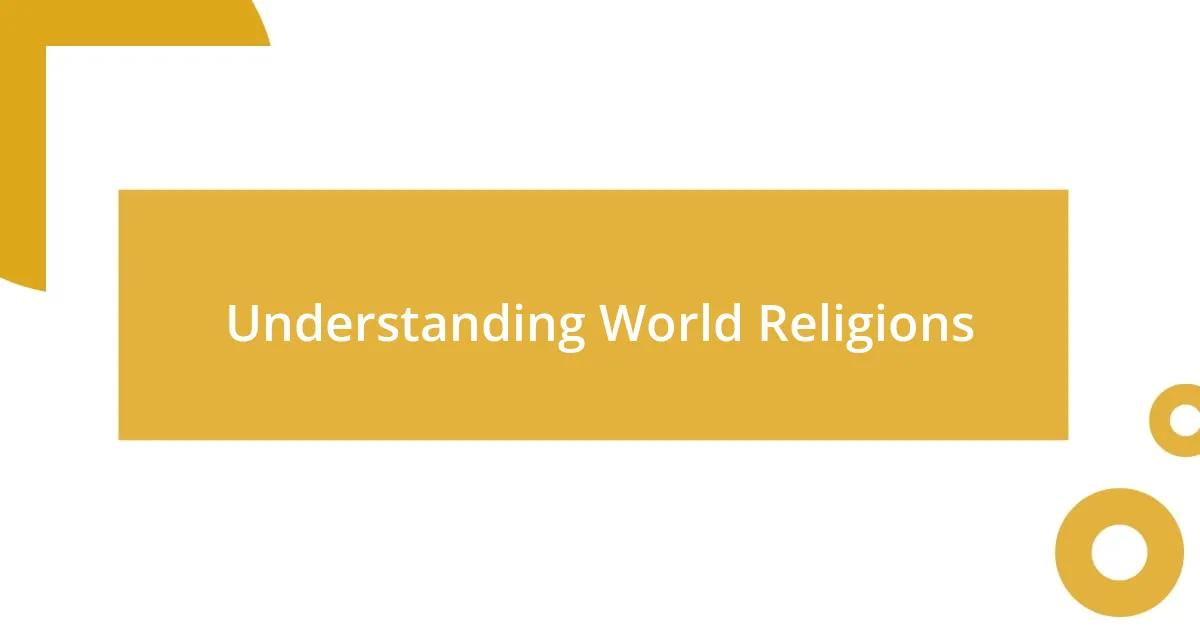
Understanding World Religions
When I first began exploring world religions, I was struck by the deep emotional connections people form with their beliefs. It made me wonder—what drives someone to find solace in a particular faith? For many, it’s the community and shared experiences that provide comfort and understanding during challenging times. I remember attending a local temple and feeling a sense of belonging—something I hadn’t anticipated in such a different environment.
Delving into the teachings of various religions, I realized there’s often a common thread of seeking meaning and connection. Whether through rituals, prayers, or stories, these expressions of faith deeply resonate with their followers. I vividly recall a discussion with a friend who practiced Buddhism; her insights on mindfulness transformed my perspective on my own life journey.
As I navigated through the intricate landscapes of beliefs, I was continually amazed by how each tradition offers unique pathways to understanding the world around us. Have you ever pondered how these diverse practices intersect? In my experience, each religion serves as a lens through which one can view the complexities of existence, revealing both unity and diversity in human experience.
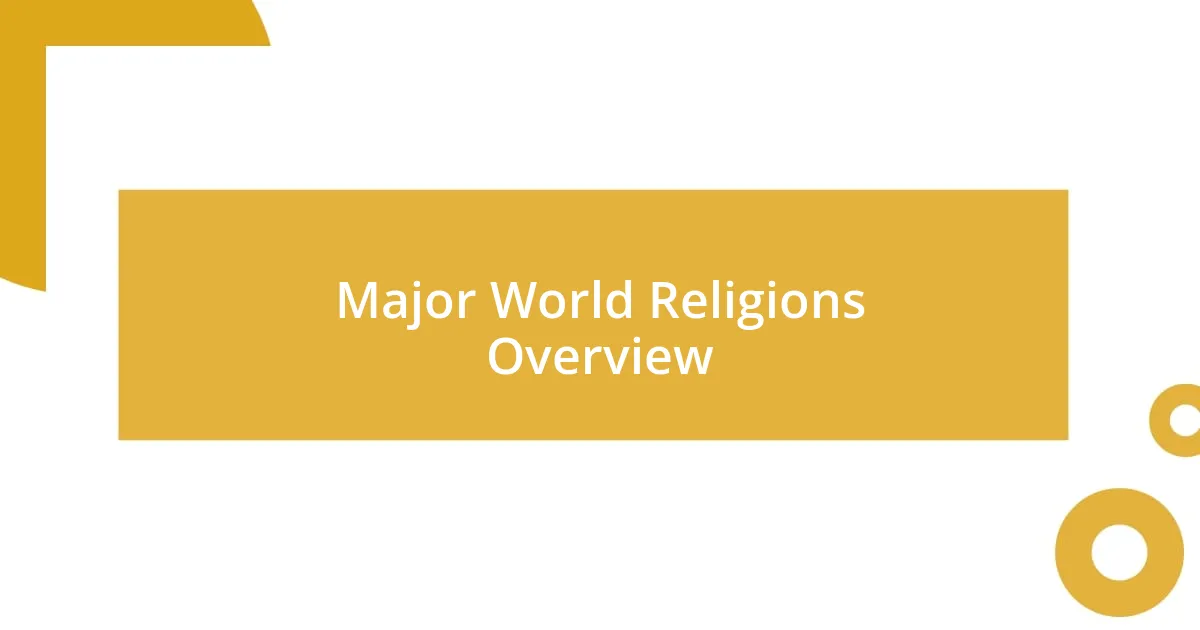
Major World Religions Overview
When considering the major world religions, I find it fascinating how they collectively shape human culture and individual identities. For instance, my encounters with Islam during a cultural festival opened my eyes to the beauty in their prayers and practices. Each time I shared a meal with Muslim friends during Ramadan, I experienced a sense of profound unity, one that transcended our differences through shared values of compassion and gratitude.
In exploring Christianity, I was often touched by the warmth of community gatherings. I recall attending a small church service where the sense of purpose among the members was palpable. It was a reminder of how faith can inspire hope and foster strong bonds among individuals. The intimacy of those gatherings showcased the core Christian tenet of love, which can be a guiding light in our lives.
Judaism offers yet another unique path, one that deeply emphasizes tradition and history. During a Passover Seder, I was moved by the ritual storytelling and the emphasis on remembrance within the Jewish faith. It taught me how powerful it is to connect the present to our collective past, and how narratives within religions often define and shape the way we understand our identities. Each major religion, with its distinct practices and beliefs, presents rich avenues to explore meaning and existence.
| Religion | Key Beliefs |
|---|---|
| Christianity | Faith in Jesus Christ, the importance of love and salvation |
| Islam | Submission to Allah, following the Quran, and practicing the Five Pillars |
| Buddhism | Pursuit of enlightenment through practices like meditation and mindfulness |
| Hinduism | Beliefs in dharma, karma, and the cycle of reincarnation |
| Judaism | Covenant with God, importance of tradition and community |
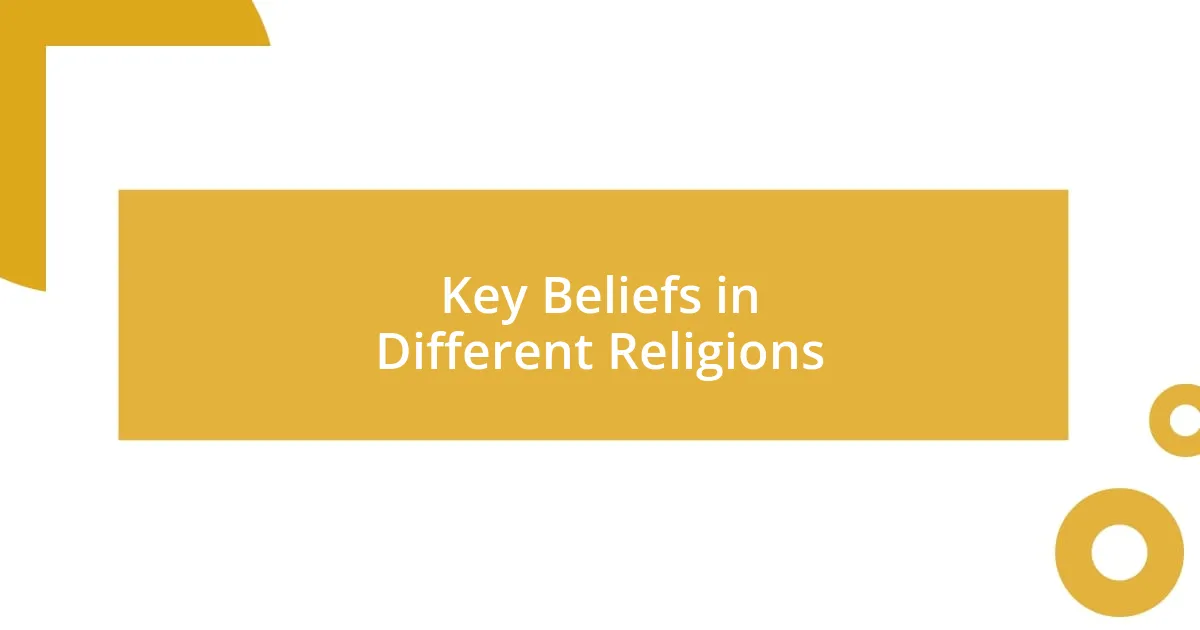
Key Beliefs in Different Religions
The beliefs that underpin various religions can transform how individuals navigate their lives and relationships. I remember speaking with a friend who identified as Hindu; she passionately described the concept of dharma, explaining how it served as both a moral compass and a guiding principle in her family’s daily actions. That conversation resonated deeply with me, illuminating the profound ways in which belief systems inform ethics and conduct.
Here are some key beliefs across different religions:
- Christianity: Emphasis on love, the importance of Jesus as the savior, and the promise of eternal life.
- Islam: Following the teachings of the Quran, devotion through the Five Pillars, and the significance of community prayers and fasting.
- Buddhism: Cultivation of mindfulness, the importance of overcoming suffering, and the pursuit of enlightenment through self-discovery.
- Hinduism: Understanding the concepts of karma and reincarnation while striving to fulfill one’s dharma in life.
- Judaism: Importance of community bonds, observing traditions, and a covenant with God that guides moral decisions.
Reflecting on these teachings, I often find myself inspired by how inclusive and vibrant these beliefs can be. At a community event celebrating Diwali, the shared joy felt during the festival connected me to cultural narratives and the idea of light overcoming darkness. It’s moments like these that truly emphasize that regardless of our differences, the core values of love, compassion, and understanding are universal threads that weave humanity together.
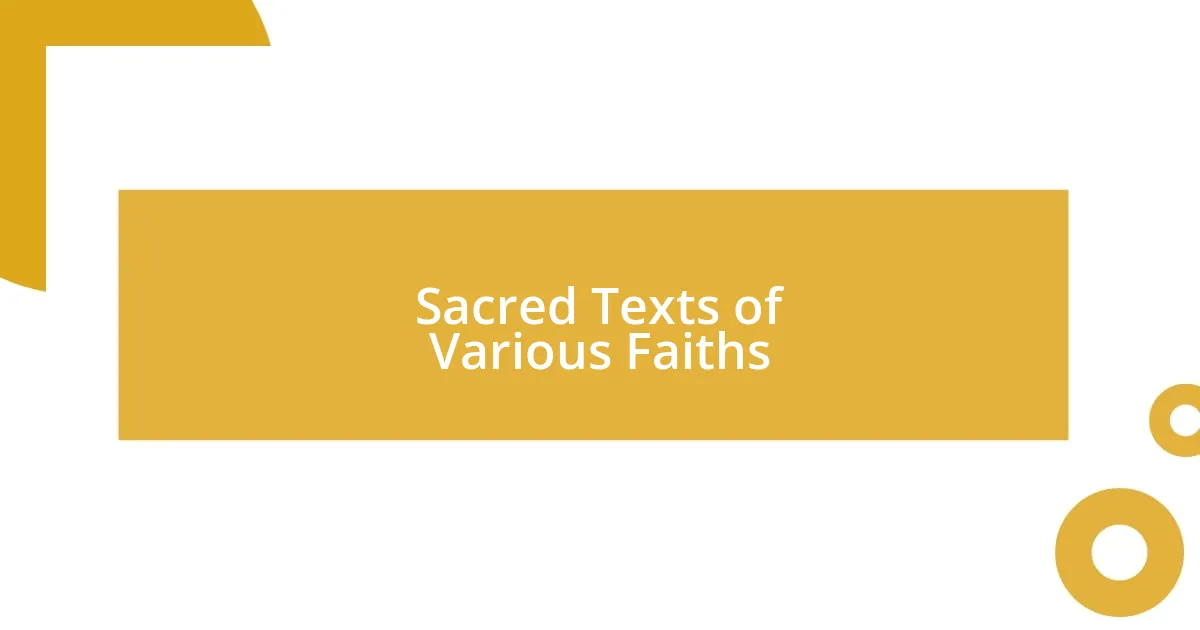
Sacred Texts of Various Faiths
Sacred texts hold a significant place in the hearts and minds of believers across various faiths, guiding principles and practices in meaningful ways. I once stumbled upon a beautiful translation of the Quran during a visit to a local bookstore, and it reminded me how differently spiritual wisdom can be articulated. The poetic language encapsulated the essence of human experience, inviting me to reflect on my own values while connecting deeply with another faith.
I recall an afternoon spent at a serene Buddhist temple, where the monks shared teachings from the Dhammapada. Their gentle recitation of verses about compassion and wisdom resonated with me, offering a profound sense of peace. It’s incredible how texts like these can inspire us to pause and reconsider our actions. They challenge us to think: how often do we take the time to read and reflect on what drives our own beliefs?
The Torah, with its rich tapestry of stories and commandments, sparked a meaningful conversation with a Jewish friend during a Shabbat dinner. As we discussed the significance of the commandments, I felt the weight of tradition woven through every word. It made me wonder: how do the sacred texts of different religions not only inform faith but also shape the cultural practices and community bonds of those who follow them? Exploring these texts can lead us to a deeper understanding of faith’s role in our daily lives.
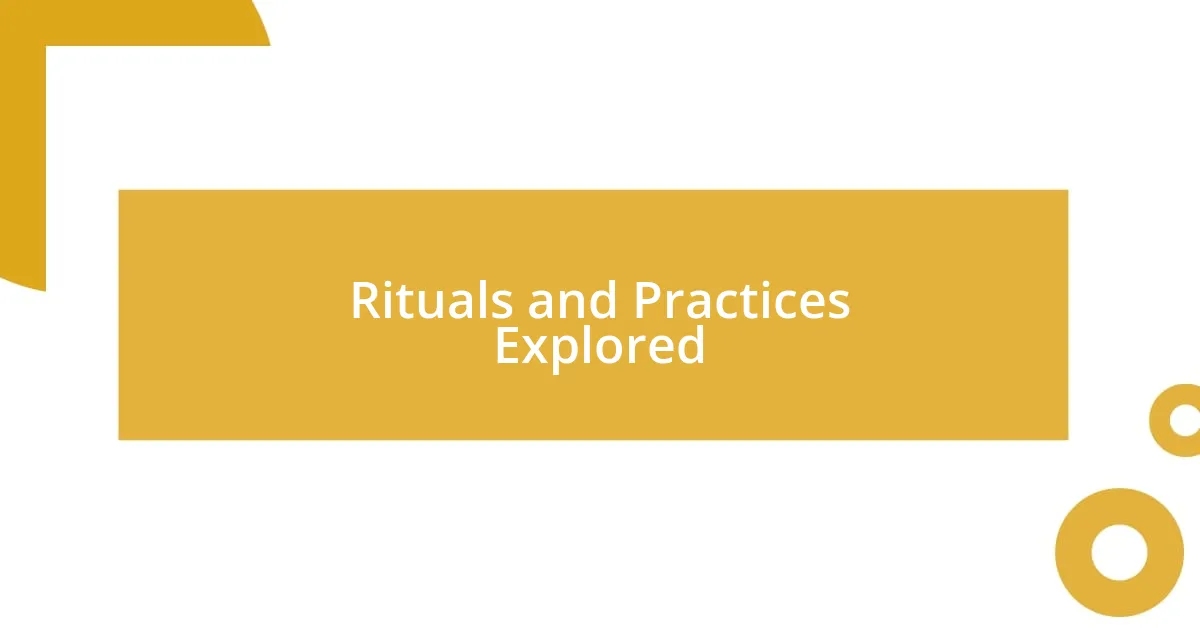
Rituals and Practices Explored
Rituals and practices are the heartbeat of many religious traditions, each carrying profound meaning and significance. I remember attending a Seder meal for Passover, where the rituals, from breaking the matzah to sharing stories of liberation, created a palpable sense of connection to history. It made me reflect: how do these customs not only preserve heritage but also forge community bonds that transcend time?
Engaging with the practices of different faiths has opened my eyes to how deeply intertwined routines can be with spirituality. For instance, witnessing the fervor of a Muslim friend as they prepared for daily prayers brought an unexpected humility. I found myself wondering if we, too, might benefit from incorporating dedicated moments of stillness in our busy lives. Isn’t it interesting how simple actions—like lighting a candle or chanting a mantra—can ground us in the present and remind us of larger truths?
One unforgettable experience was participating in a Native American smudging ceremony, where the fragrant smoke of sage was believed to cleanse negative energies. The reverence in the air left an imprint on my heart, prompting me to consider how rituals can serve as powerful tools for healing and connection. Have you ever thought about a personal practice that brings you peace? In exploring these varied expressions of faith, I’ve found that rituals often reflect a universal desire for understanding and connection—something we all crave at our core.
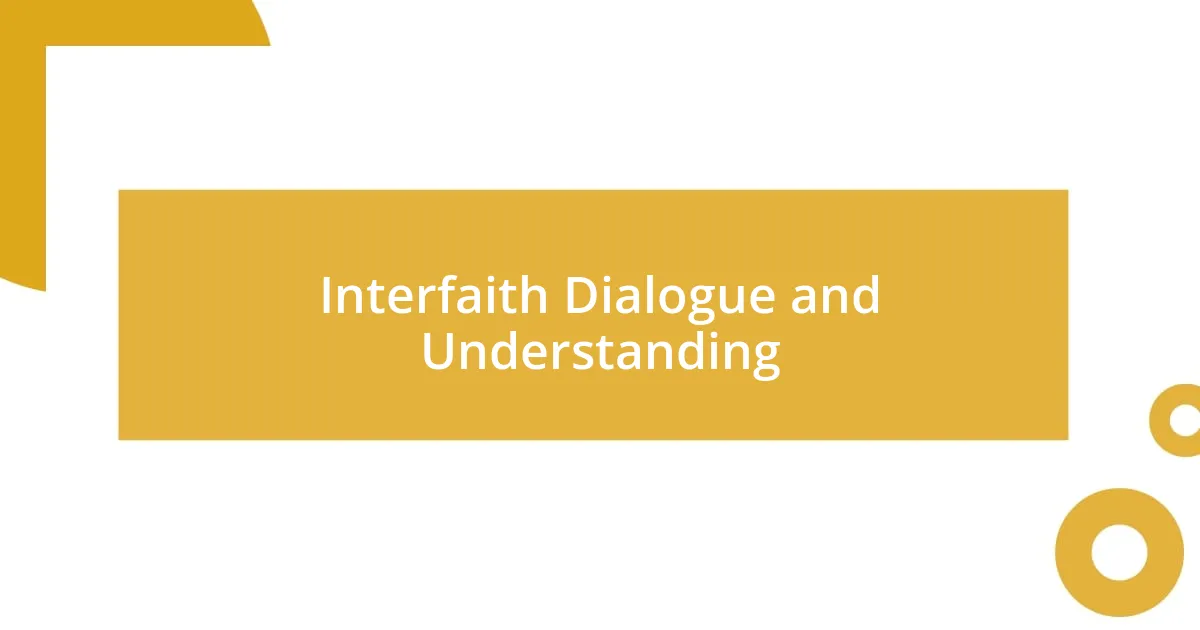
Interfaith Dialogue and Understanding
Interfaith dialogue serves as a bridge that fosters understanding and respect among diverse belief systems. During a community event that brought together individuals from various faiths, I found myself in a circle of laughter and shared stories. Listening to each person articulate their beliefs created an atmosphere of camaraderie rather than competition. It made me realize how much we all long to connect on a human level despite our spiritual differences.
One memorable encounter was a discussion on the concepts of forgiveness in Christianity and Islam, where a friend shared her struggles with reconciliation. I was struck by the similarities in our narratives, clarifying that forgiveness is a universal challenge, irrespective of the faith we practice. Have you ever considered how shared struggles could unite us beyond religious boundaries? This realization not only deepened my appreciation for my friend’s journey but also reinforced that recognizing our common humanity can pave the way to greater empathy.
As I sat in on a workshop about interfaith understanding, I was amazed by the diverse perspectives offered by participants. One participant spoke passionately about the teachings of the Bahá’í Faith emphasizing the oneness of humanity. It made me think of the challenges we face in addressing global issues together. What if more people engaged in these dialogues? I believe that cultivating an appreciation for each other’s beliefs can lead us all toward a more peaceful coexistence.
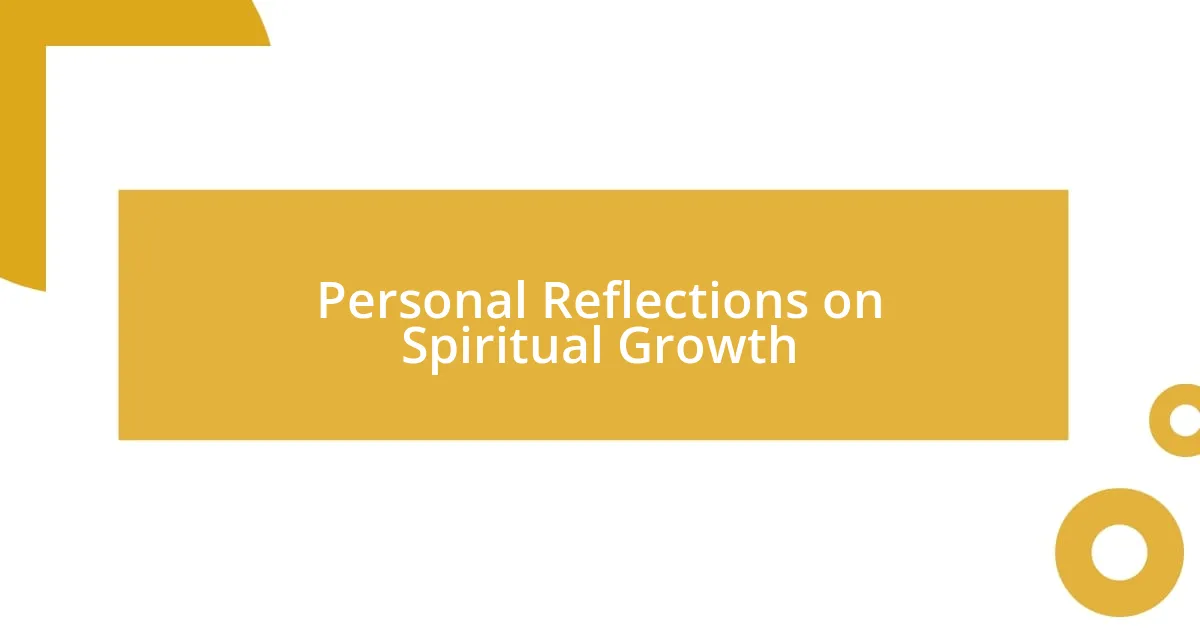
Personal Reflections on Spiritual Growth
Reflecting on my spiritual growth, I often find myself revisiting times when I wrestled with big questions about my purpose and beliefs. I remember the serene afternoon I spent on a meditation retreat, surrounded by whispers of nature. As I sat in silence, I felt layers of tension begin to peel away, revealing a deeper connection to myself and the world around me. It made me wonder—what if we all took the time to simply listen to our inner voices?
Another poignant moment occurred when I volunteered at a local shelter and witnessed the profound dignity of the individuals there. Their stories of resilience and hope struck a chord in me, shifting my perspective on spirituality. It left me pondering: can true spiritual growth occur without serving others? I realized that my understanding of spirituality expanded as I engaged with the struggles of others, reminding me that compassion can be a guiding force in our journeys.
In my exploration of different beliefs, I often encountered the idea of transformation—how challenges can catalyze personal growth. I vividly recall a challenging conversation with a friend who held beliefs vastly different from mine. Through respectful dialogue, I discovered that vulnerability and openness can lead to profound understanding. Reflecting on this experience, I can’t help but ask: what transformations await us when we step out of our comfort zones? Each encounter has taught me that spiritual growth is an ongoing journey, enriched by the perspectives we embrace along the way.

